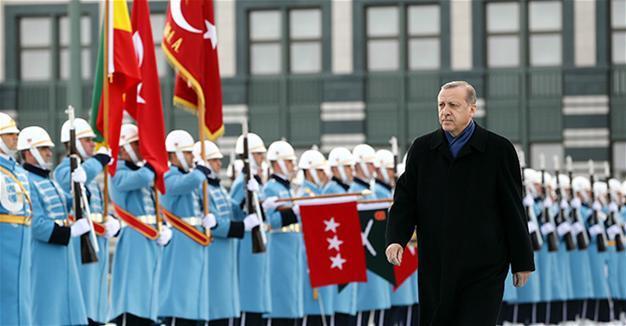President Erdoğan approves charter draft, referendum on April 16
ANKARA

AFP photo
President Recep Tayyip Erdoğan approved constitutional amendments on Feb. 10 that will bring drastic changes to the country’s political system, including a shift to an executive presidential system from the current parliamentary system, clearing the way for a referendum to be held on April 16.The amendments were sent to the Prime Minister’s Office on Feb. 10 to be published in the Official Gazette ahead of the public vote.
The president’s approval came eight days after the parliament sent the amendments for his approval after passing it by more than the 330-vote threshold needed to send it to a referendum for final approval.
“Our president has approved the constitutional amendment so the date of the public vote has become clear. God willing, the referendum will be held on April 16. Our citizens will issue the final approval on this amendment, which was completed by our parliament and signed by our president,” Prime Minister Binali Yıldırım said.
Earlier on Feb. 10, Deputy Prime Minister Numan Kurtulmuş expressed his anticipation for a campaign in line with the maturity of Turkish democracy, saying both “yes” and “no” voters would be able to participate.
“We believe that our nation will substantially say ‘yes’ to this proposal. I sincerely believe that Turkey will shift to a management model with a more active administration that will provide political and economic stability in full,” Kurtulmuş said.
The Turkish parliament sent the constitutional amendments for the president’s approval on Feb. 2, 12 days after it passed the parliament.
The constitutional amendment will bestow strong powers on the president, who will exercise all the authorities of the prime minister and cabinet and possess the authority to issue decrees, appoint vice presidents and cabinet members from outside the parliament and hold the title “head of the state,” which will enter the constitution as a term for the first time since it was used for Kenan Evren, Turkey’s former coup leader and seventh president, as part of a provisional article in the 1982 Constitution.
The president will also be given the authority to annul parliament and declare an election, while they will also have the authority to declare a state of emergency, during which they will have the authority to issue decrees without any restriction of jurisdiction.
The duties and authorities of the parliament will be amended in the amendments, with its authority to supervise ministerial cabinet and ministers, as well as its authority to assign cabinet members, being abolished. Lawmakers will only be able to supervise ministers and the government with written statements, since the motion of interpellation will also be abolished.
The configuration of the Supreme Board of Judges and Prosecutors (HSYK) will similarly be altered, with the number of members reduced from 22 to 13. Out of 13 members, four will be appointed by the president, while the justice minister – who will be appointed by the president – will be the chair of the board, while the undersecretary will be a permanent member. The seven remaining members will be elected by the parliamentary majority, which will likely be the political party of the president.
















